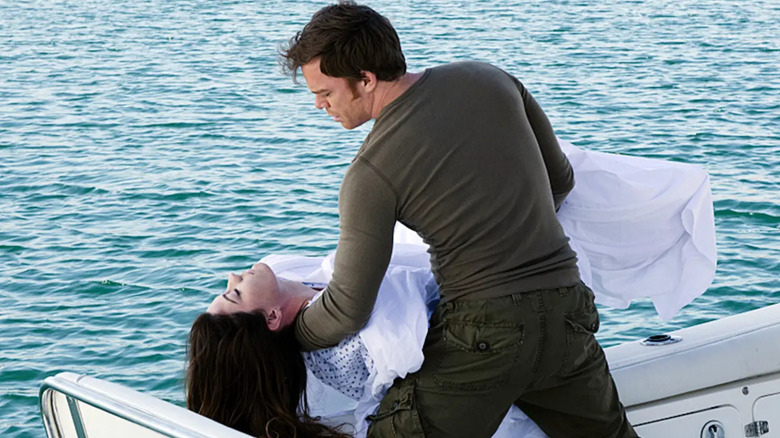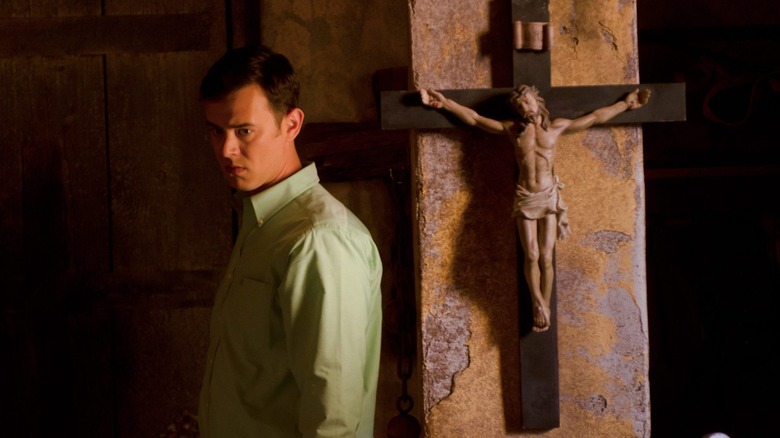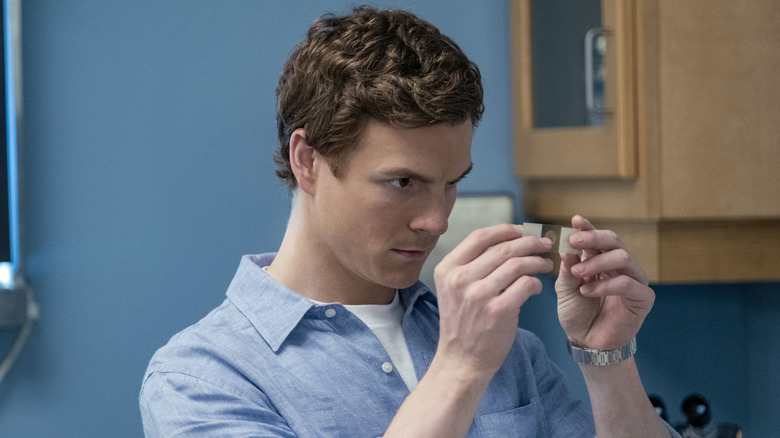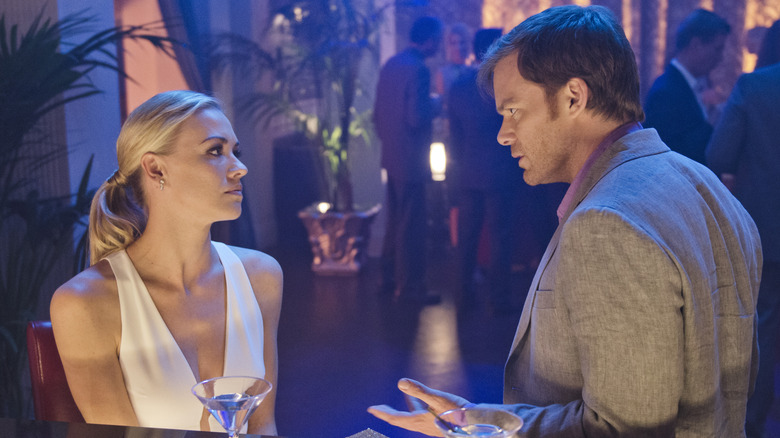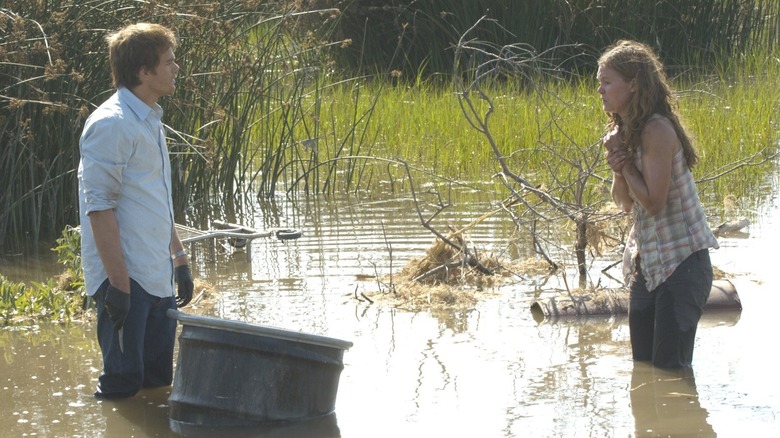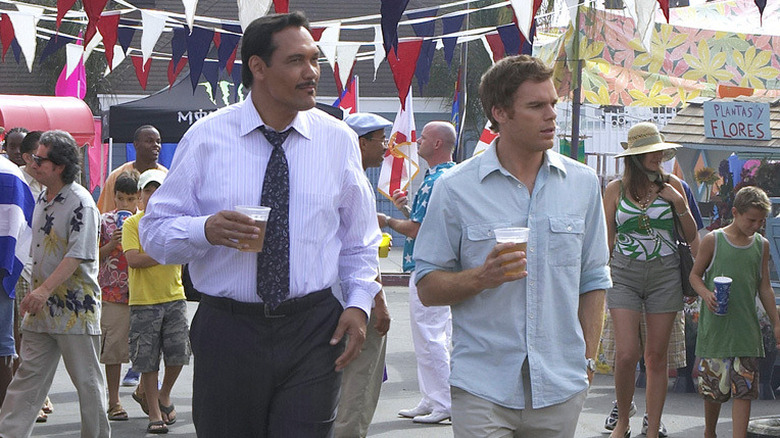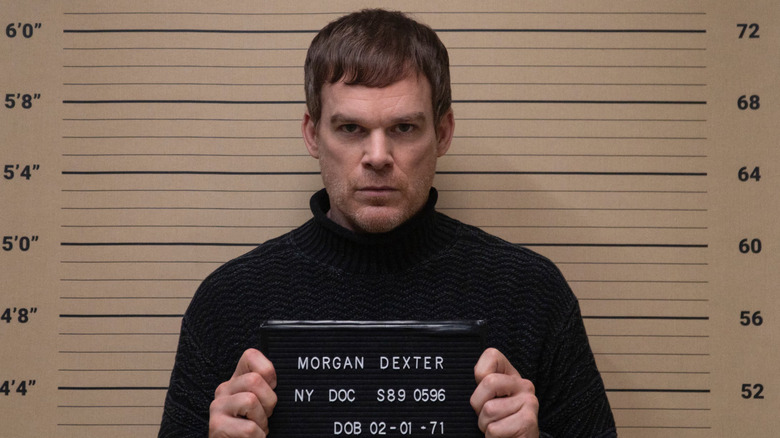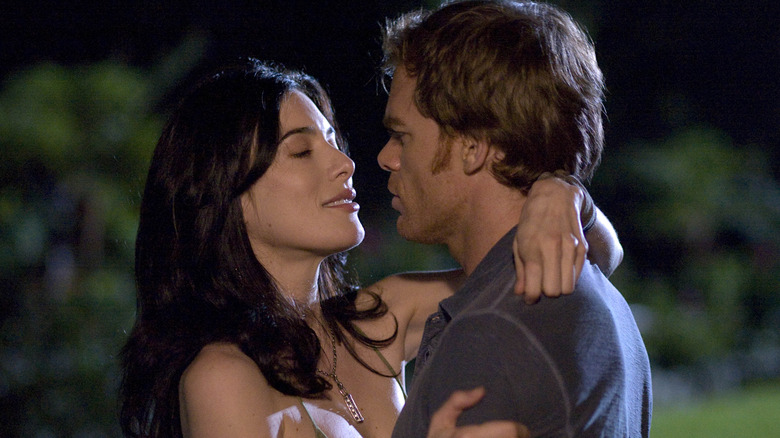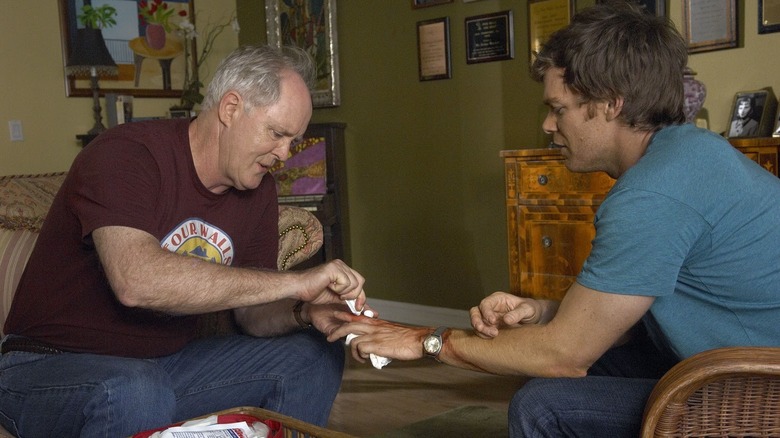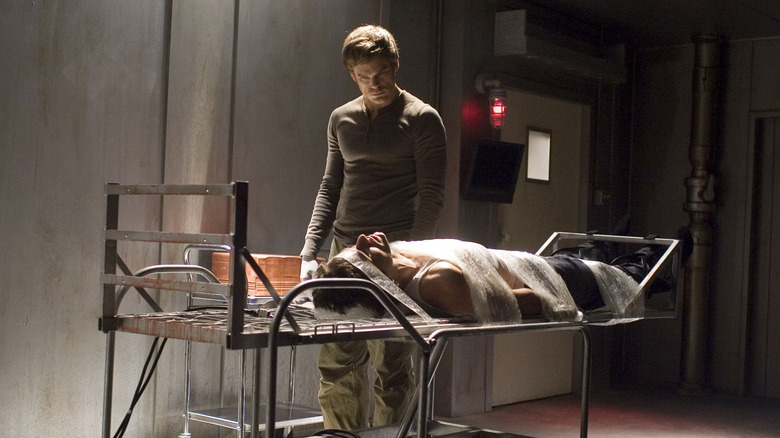Every Season Of Dexter Ranked Worst To Best (Including Original Sin & New Blood)
With a reputation almost as murky as its titular antihero, it's a wonder that "Dexter" has been able to maintain a legacy as one of the most popular TV shows Showtime ever produced. Despite setting the unfortunate standard for the kind of show that goes on way longer than it should, this late-2000s thriller about a vigilante serial killer convincing himself he's on the side of the angels remains culturally relevant. That's thanks in no small part to series star and executive producer Michael C. Hall, who has worked closely with the network to bring "Dexter" back from the dead ... literally.
Hall is set to return to the small screens as Dexter Morgan with the new sequel series "Dexter: Resurrection," which will pick up shortly after the end of the 2021 miniseries "Dexter: New Blood." That latter show has since been recontextualized by the prequel series "Dexter: Original Sin." With so much of the past, present, and future of "Dexter" being dug up — and with some other shows that get our blood pumping in the same way — there's no better time to examine some blood slides and unearth our laminates, as we reopen our investigation into which seasons of "Dexter" still slay to this day.
10. Season 8
Given how sharp and refreshing "Dexter" was when it first began, it's always been the show's greatest shame that it went out with such a depressing whimper. The 8th and final season fails to breathe any life into the final adventure of its complicated antihero, in large part because it still seems unsure of what its characters — or the audience, for that matter — should have learned from the decade-long killing spree of Dexter Morgan.
In the wake of Debra (Jennifer Carpenter) killing María LaGuerta (Luna Lauren Velez), both she and Dexter have been written into the corner of a series already stuck in an exhausting holding pattern, as it endlessly relitigates when and why it might be okay to do a murder. While Deb begins the season a ghost of her former self, haunting the series until she's mercifully exorcised in the finale, Dexter himself is essentially allowed to reset the moment a new serial killer (the relatively unmemorable "Brian Surgeon" Oliver Saxon, played by Darri Ingolfsson) is injected into the plot.
From there, all the characters you used to love and now force yourself to stay invested in are moved around like lifeless chess pieces, morosely suffering through every numbly horrific moment the series can throw their way as they await the end. Much has already been said about how the finale — which sees Dexter riding off into a storm without being identified as a killer — is underwhelming. The showrunners themselves apparently planned to have him executed in one alternate ending but were told by Showtime higher-ups that Dexter had to survive whatever fate awaited him. Originally, Michael C. Hall felt the ending was largely open to audience interpretation in regards to whether or not Dexter truly survived, but, as we now know, the plan was to have him live to kill another day.
9. Season 6
Ironically, the first truly bad season of "Dexter" is the one with the highest body count. Dealing broadly with themes of control and fate, it isn't entirely shocking that the series suddenly feels so contrived as it attempts to wring out what drama it still can (without tearing the fabric of a very tired plot).
A pre-"Fargo" Colin Hanks guest stars alongside Edward James Olmos as the murderous duo known as the "Doomsday Killers." The first time you encounter this season (especially if it was close to its original air date of 2011), you're likely to get significant mileage out of the late-game twist that Hanks' seemingly reluctant Travis Marshall has actually been hallucinating Olmos as a stern murder mentor — but if you happen to see that twist coming after years of similarly employed "Fight Club" twists since, season 6 of "Dexter" has nothing else of note to offer you.
Then, of course, there's the infamous Debra storyline from this season, which sees her develop romantic feelings for her adoptive brother right after being promoted to lieutenant. Over 10 years later, this choice still reeks as one of the most questionable twists ever employed by a show of this pedigree. As for Dexter himself, his arc is once again reduced to a repetitive exploration of his own morality when judged in concert with his worth as a father and brother. By this point in the series, the creators seem more and more convinced that the world actually benefits from the existence of the Bay Harbor Butcher, and one starts to wonder whether it's them or the network that can't let him die the death he deserved long before. Either way, by the end of season 6, the audience is already eagerly awaiting the funeral.
8. Dexter: Original Sin
"Dexter: Original Sin" is by no means a bad show on its own merit — it just hasn't really justified its existence as of the completion of its 1st season. Touted as a prequel to the original series, the tone, world, style, and cast are so similar that it just feels like Showtime discovered a hack to retroactively tack on more episodes worthy of the lesser seasons of the original "Dexter." Unlike a true prequel like "Better Call Saul" exists as a compelling piece of storytelling on its own, and expands upon the world in the same way a sequel would (hence the "quel" in "prequel"), there is nothing about "Original Sin" that couldn't have been done in the first "Dexter" series if it had just been set a few years earlier.
That's occasionally a benefit for the show. The familiarity of Miami Metro is oddly comforting, with Pat Irwin's score reviving so many elements of Daniel Licht's work from the original series that it even sounds like "Dexter." Further, casting directors John Papsidera (who also helped cast James Gunn's "Superman") and Kim Winther deserve all due praise for assembling an ensemble with a disturbingly uncanny resemblance to their predecessors (save for Christian Slater, who is perfectly fine but not really doing anything to evoke the performance of original Harry Morgan actor James Remar). Everyone works, from Patrick Gibson's Dexter and Molly Brown's Debra to James Martinez's Angel Batista.
However, in chasing the original show's feel so closely, the gaps in the writing and directing are all the more glaring. The humor isn't as clever, the plotting always feels strenuous, and any attempts at stretching the visual language of "Dexter" — while admirable — are jarring when the rest of the series is so inelastic in its mimicry. It's ultimately a clumsy and unnecessary product that will sadly be even less relevant going forward, with a true sequel series imminent.
7. Season 7
It was always clear that the end point of "Dexter" would be closely connected with Debra Morgan realizing that her brother is the very serial killer so many of her friends and loved ones gave their lives hunting. In hindsight, this discovery should have directly preceded whatever the show's final outing was going to be, but season 7 does briefly make a compelling case for a more protracted option.
The only thing that could make up for the borderline character assassination Debra suffered throughout season 6 is allowing her to soberly and competently wrestle with her brother's true nature in the following season. Even if she eventually arrives near the bizarre "murder is good when the victims are bad" conclusion the show desperately clings to, the level of personal betrayal she's allowed to process at the hands of both Dexter and her late father is not only dramatically compelling and emotionally moving but provides some of the only sound pushback Dexter gets against his myopic worldview. Her seeing his true self shatters his world in ways not even the death of his wife did — because, in reality (and as beautifully established throughout season 7), the greatest tragedy Dexter can suffer is being forced to see, through the eyes of someone he loves, that he is the villain of his own story. Suffice it to say, this idea drives the best moments of the season and lays the groundwork for the more psychologically engaging story beats yet to come in subsequent seasons.
The tragedy of this arc is seriously undercut by the introduction of Hannah McKay (Yvonne Strahovski), a romantic interest for Dexter that offers no real surprises, and whose forgiving gaze softens the damage the audience should be allowed to experience. Ray Stevenson is the true standout of the season as Isaak Sirko, a charismatic Ukrainian mobster hunting Dexter to avenge his slain lover.
6. Season 5
If there's one season of "Dexter" you're likely to forget, it's season 5. This isn't because it isn't a well-told, entertaining story in and of itself, but because it's actually so self-contained and isolated from everything else that happens in the series that it's the last thing you're thinking about once the show starts to go off the deep end in subsequent outings.
To jog your memory, season 5 is the "Barrel Girl" season, in which Dexter (grieving the recent murder of his wife) teams up with Lumen Pierce (Julia Stiles), the survivor of a horrific murder-torture plot. With her help, Dexter is able to track down a ring of serial killers all carrying out the wishes of the voyeuristic and magnetically sadistic Jordan Chase (future "Elementary" star Jonny Lee Miller), who leads a double life as a world-renowned self-help-guru-slash-motivational speaker.
Though Miller and Stiles are both totally new to the "Dexter" world, the dynamic they create with Michael C. Hall is one of the strongest we get to see in the series overall — and, given that this came out in 2010, its examination of the connection between alpha male culture, pop-psychology, and violent misogyny feels uncomfortably prescient. Pull any quote from Jordan Chase's lectures, and it'll sound like something straight out of the post-2020 YouTube "manosphere."
The only reason "Dexter" season 5 isn't higher on this list is that it kind of drops the ball on all storylines not directly related to Dexter's guilt over losing Rita (Julie Benz). Even baby Harry, who is found abandoned in blood with his dead mother, doesn't get much attention from the writers until season 6.
5. Season 3
In terms of quality and impact on the overall story, season 5 and season 3 are pretty much neck and neck — but Jimmy Smits is so good as the overarching special guest star that we're willing to give his season the slight edge. He plays Miguel Prado, an influential Miami assistant district attorney who bursts into Dexter's world when his brother, Oscar, shockingly turns up dead in a drug den. Miguel is immediately drawn to Dexter's darkness, so much so that Dexter even takes him under his wing as a partner in crime (or justice, as the two of them fascinatingly convince one another). This would all be entertaining enough on its own, but is elevated by the added tension that Oscar was not only murdered by Dexter himself but was a kill outside the ever-sacred Code of Harry.
It's a perfect storyline to follow up the gutting conclusion of season 2, which saw Dexter come face-to-face with the moral consequences of his actions for the first time. Through Miguel, he and the audience go through all the rationalizing together, with his new friend's apparent credibility and enthusiasm providing a false sense of comfort for the portion of his psyche (and, again, the audience) that believes the Bay Harbor Butcher is a force for good. Though his ultimate murder of Miguel mostly serves to send him to the altar with a clearer conscience than before, enough doubt is planted by that point for viewers to grapple with his morality for themselves.
4. Dexter: New Blood
By the time "Dexter" finally ended in 2013, even showrunner Clyde Phillips felt the original series had lost its way. Once a darkly comedic look into the life, psychology, and (albeit limited) emotions of a killer surviving the only way he knew how, the show had strangely descended fully into the realm of an escapist thriller about a charming vigilante doing what the law was too ineffective to accomplish. There was, of course, never a serious critique of policing on "Dexter," outside that "bad cops" should be executed and "good cops" should be allowed to be the executioners.
For the most part, the sequel miniseries "Dexter: New Blood" seems to exist to both capitalize on and rehabilitate one of Showtime's most recognizable pieces of intellectual property. And, for the most part, that's exactly why it works. Unlike "Original Sin," "New Blood" doesn't seem interested in restarting the perpetual motion machine of the original series; instead, it graciously restrains itself to an attempt at delivering the sort of send-off fans deserved over a decade ago. It isn't perfect — the exact circumstances of Dexter's "demise" still feel like the character gets to trade personal sacrifice and emotional growth for meaningful, psychological self-recognition or accountability (though the final season of "You" may have proved that sort of thing as overrated anyway). Even so, in terms of scripting and visual presentation, "New Blood" is the only newer season of "Dexter" that fully lives up to its potential.
3. Season 2
For many readers, the placement of "Dexter" season 2 on this list will come as something of a shock. It has long been considered the gold standard of the series among fans and even boasts the highest critics' score of any season of "Dexter" on Rotten Tomatoes as of writing.
On its own, season 2 is every bit as exceptional as fans have proclaimed that it is. The discovery of the Bay Harbor Butcher's burial site in the opening episode boldly flips the series on its head, immediately forcing Dexter to contend with compelling threats old and new. From Quantico, the FBI sends special agent Frank Lundy (played by Keith Carradine in a performance so undeniably charming, you can kinda buy his disconcerting fling with Debra); within Miami Metro, Sergeant James Doakes' (Erik King) almost comedically unwavering suspicion of Dexter's secret nature shockingly, yet satisfyingly pays off with him being the first to discover that their resident blood nerd Dexter is a serial killer with a body count north of 100.
But in creating such a distinct sophomore outing by expertly disrupting the status quo of the series, "Dexter" gets spooked by its own shadow and retreats before the finale can take us somewhere else unexpected for season 3. Thanks to an admittedly justified last-minute intervention from Lila West (Jaime Murray), Dexter is saved from having to choose between his code and his freedom. That avoidance keeps chewing at the series as it progresses, and is what ultimately the true "original sin" that prevents the show from evolving past this false peak.
2. Season 4
Though the season 2 finale and the entirety of season 3 had shaken viewers of the expectation that the status quo would be meaningfully changed ever again, season 4 brought hope from the most unexpected of places. With an apparently reluctant John Lithgow giving a career-highlight performance as "The Trinity Killer" Arthur Mitchell (the deadliest killer featured on the show), "Dexter" found one last gasp of dark brilliance, delivering some of its best episodes ever as it approached an unforgettably lethal season finale.
The one way the series did benefit (at least in the short term) from Dexter's newfound commitment to his code by the end of season 3 was that it allowed the story to sideline the more obvious aspects of the moral argument to explore challenges that were unique to "Dexter" — like, for example, whether or not it's possible for a serial killer to be a legitimately decent husband or father. It's through this question that Arthur works as the best mirror to Dexter of any of the killers he faces off against, ultimately proving that indulging in a violent double life would inevitably bring that very violence home to those he rests his flimsy, fake life upon. Where most seasons end with Dexter's worldview strengthened in some way, "Dexter" season 4 is the first time he faces consequences that could actually completely destroy how he sees himself.
1. Season 1
As disappointing as it may be to accept, Dexter Morgan's first cut was undoubtedly the show's cleanest. It is simpler, leaner, and thereby more elegant, narratively speaking, than season 4, and lacks the timidness or fallout that haunts the biggest choices made in season 2.
Even on its own terms, however, "Dexter" season 1 is a nearly perfect season of television. Michael C. Hall, Jennifer Carpenter, and Erik King waste no time getting their footing in their respective roles, taking immediate ownership of the series' abrasive dialogue and unusual comedic tone. Hall, in particular, is a revelation as Dexter, taking his place in the pantheon of 2000s TV antiheroes alongside Walter White and Tony Soprano with a performance that carved out an entire substyle of antihero for other actors to emulate and play with in the future.
Most of all, the 1st season of "Dexter" stands alone when it comes to its plot, melding the procedural genre with an overarching mystery full of cleverly placed clues and satisfying twists. Not even with Travis Marshall or Jordan Chase was the series ever able to create such delightful surprises for the viewer as it was when it was driven by the race to unmask the Ice Truck Killer. It's a season of television so good it's hard not to fight through the following seven.

